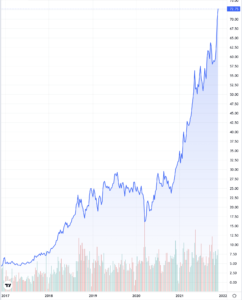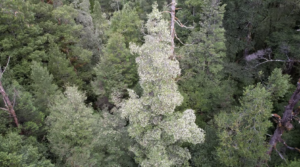Sunday environmental round-up
February 13, 2022
Greenhouse gases explain the science of climate change but money, greed and deception explain our failure to tackle it.
Australia’s carbon taxes
Some people have a tremendous ability to convey quite complex information in an easily understandable way and to do it with a smile. Alan Kohler is one of those fortunates. These attributes are on display in spades in his explanation of Australia’s not one but two carbon taxes – if you believed technology-not-taxes-Scotty, you’d think we didn’t have any. First, there is the price that CO2 polluters pay CO2 abaters (people who plant and grow CO2-absorbing trees, for instance) for Australian Carbon Credit Units (ACCUs) issued by the government. At the beginning of 2021, the owner of a coal-fired power station, say, had to pay a tree owner about $16 for an ACCU. That allowed the power station to emit a tonne of carbon. The price is currently over $50 and expected to keep rising. Of course, that cost gets paid by the customer, just like a tax.
Second, the influx of cheap renewable energy into the electricity generating system is pushing down the demand for electricity from coal-fired power stations and causing financial problems for the owners. That’s capitalism, you might think … but not the current government. They are planning to keep their mates happy by having consumers pay coal-fired power stations not only for how much electricity they actually produce but also for how much they could produce (a ‘capacity mechanism’). The money won’t go to the government but the consumer still pays it … again, effectively just like a tax. Well, worse really, we get something for our taxes. Read Alan, he says it all better and more amusingly.
Europe’s Emissions Trading System

Traversing the globe (to Alan Joyce’s delight), the graph above shows that the carbon price in the European Union’s Emissions Trading System (EU ETS) increased from less than €5 per tonne of CO2 in 2017 to around €30 per tonne at the beginning of 2021 to €75 by the end of the year. So far in February it’s been over €90 per tonne. The EU ETS is a cap-and-trade system covering about 12,000 energy and industrial companies responsible for about 40 per cent of the EU’s emissions. Companies that exceed their designated annual cap on emissions have to buy credits from companies that have not reached their cap and have credits to spare. If the EU introduces a border adjustment levy for imported goods from countries that haven’t put a price on carbon, Australian exporters are going to have to pay the going rate for the weight of greenhouse gas emitted during the production of the goods. The carbon levy they’ll be paying will benefit all those over-governed, espresso-guzzling European greenies rather than we free-spirited, technology-loving Australians.
New asset class for environmental exploitation
My crude understanding of asset classes is that they are groups of companies that paddle in the same pond: they share some operating characteristics, are regulated in similar ways and produce similar products. A bit like dividing animals into fishes, amphibians, reptiles, birds and mammals. The New York Stock Exchange has created a new asset class which will allow investors (for instance institutional and private investors, corporations, sovereign wealth funds and international development banks) to invest in something that is intrinsically valuable but has, to date, been excluded from financial markets, specifically … wait for it … the natural environment! The purpose, it is claimed, is “to preserve and restore the natural assets that ultimately underpin the ability for there to be life on Earth.” A Natural Asset Company (NAC) will “hold the rights to the ecosystem services produced on a given chunk of land, services like carbon sequestration or clean water” and will then manage and grow those natural assets and sell the produce, for instance food, tourism, clean water, pollination, carbon sequestration, to make a profit, part of which will be used to preserve the asset (e.g. a rainforest) or undertake other conservation efforts. According to critics, the ultimate goal of NACs is not sustainability or conservation – “it is the financialisation of nature, i.e. turning nature into a commodity that can be used to keep the current, corrupt Wall Street economy booming under the guise of protecting the environment and preventing its further degradation.” This view is supported by IEG, one of the developers of the new asset class, who boldly state that the “Traditional Economy” is worth about US$600 trillion globally, while “Nature’s Economy” is worth over $US4000 trillion. I don’t know much about this sort of thing but my prejudice is to side with the critics. Better informed views welcome.
“We’re doing this to protect capitalism”
MSCI Inc produces ratings on companies’ environmental, social and governance (ESG) practices in the USA. These ratings are then used by investment companies to guide their decision making. There are other companies in the ESG rating game in the US but MSCI dominates Wall Street. You might be excused for thinking that a company that gets a high score on, say, the environmental dimension of the MSCI ESG index would be demonstrating exemplary practice in protecting the natural environment. Not so, however, as this extract with quotations from an interview with Henry Fernandez, billionaire, ninth largest shareholder, chairman and CEO of MSCI, demonstrate:
Fernandez concedes ordinary investors piling into such funds have no idea that his ratings, and ESG overall, gauge the risk the world poses to a company, not the other way around. “No, they for sure don’t understand that,” he said in an interview in November on the sidelines of the COP26 climate change summit in Glasgow, Scotland. “I would even say many portfolio managers don’t totally grasp that. Remember, they get paid. They’re fiduciaries, you know. They’re not as concerned about the risk to the world.”
“By the way,” he told the hosts, “we’re doing this to protect capitalism. Otherwise, government intervention is going to come, socialist ideas are going to come.”
He went further in his interview at COP26, an interview MSCI solicited as it promoted ESG and a new climate-related data product. “It is 100 per cent a defence of the free-enterprise, capitalistic system and has nothing to do with, you know, socialism or zealousness or any of that,” he said.
There you have it, straight from the billionaire’s mouth. Some members of the Australian and NSW governments possess the skills to have successful careers at MSCI, wouldn’t you say?
Offsetting carbon
So what about the projects (tree planting, renewable energy schemes, etc.) companies claim they are funding to offset their carbon emissions? Maybe you even do it yourself when you take a flight? Can you trust the claims being made to by Qantas and Google and the rest of them? This 15-minute video explains some of the realities of how offsetting works, or mostly doesn’t work. For instance:
- The attractiveness of voluntary (as opposed to mandatory) offsets is increasing rapidly as companies make net zero emissions promises, but are these commitments going to deliver or are they just corporate greenwashing?
- Most offset projects have a terrible record: 80-90 per cent don’t deliver on their promises.
- Many offsetting projects don’t produce any additional emissions reductions. They simply collect money for projects (e.g. solar and wind farms) that would gone ahead anyway. If the cost of the carbon emissions avoided is low (say below $20 per tonne), the project is probably not making a genuine additional contribution to tackling global warming.
- There are significant problems associated with verifying emissions reductions, double counting of any real or imagined reductions, and, particularly in the Global South, the infringement of local communities’ rights.
The problem is that with global emissions still rising, it’s certain that if we are to keep warming to something manageable, genuine offsetting of very-difficult-to-eliminate emissions will be necessary at least in the short to medium term. It’s difficult to be optimistic that the governments of the world will come up with and implement the regulations we need.
The video also shows what seems to be a genuine offsetting project in Germany that is re-flooding and rewilding a degraded, dried-out peat bog. It isn’t cheap though … and why would you expect it to be if it’s achieving something worthwhile?
Finally, two 40-second videos of Tasmanian leatherwood forests, one restful, the other with a hint of optimism.



